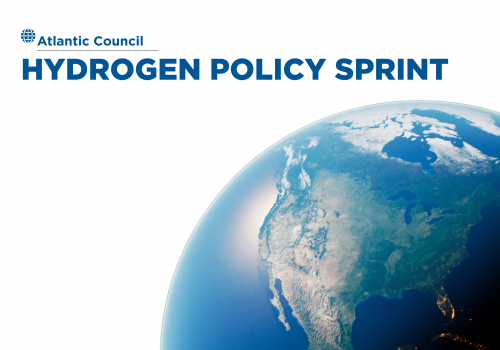Brief 1: Has hydrogen’s time come in the United States?
Hydrogen has gained significant momentum in recent months as governments and private sector leaders have announced new policies, projects, and investments, and it will be critical to the world’s ability to reach net-zero by midcentury. But the United States has lagged behind Europe and Asia in political support, market certainty, and new project development for clean hydrogen. The Atlantic Council Hydrogen Policy Sprint is a new series focused on opportunities and challenges for the development of a clean hydrogen economy in the United States. This first brief lays the groundwork for the series, examines the current state of hydrogen development in the United States, and begins to explore pathways for clean hydrogen production across the country.
Key takeaways
- Hydrogen has enormous potential to decarbonize hard-to-abate sectors such as heavy industry and parts of the transportation sector in the United States. Substituting hydrogen into these sectors would also yield significant environmental justice benefits by enhancing local air quality.
- The debate over the “color” of hydrogen that policy and investment should support—whether ‘green’ hydrogen produced from renewable electricity, ‘blue’ hydrogen from methane with carbon capture, or any of the other colors that signify different production processes—misses the point. Policy and investment should instead prioritize low lifecycle carbon intensity, regardless of the production method.
- The United States has rich opportunities to build a self-sustaining hydrogen economy with both production and demand centers and has the resources—inexpensive and abundant energy resources for production and existing pipeline infrastructure—to lead the world in hydrogen development. Regional hydrogen clusters that can scale clean hydrogen production and that can already host hydrogen demand centers—such as the port of Los Angeles and its associated transportation hubs and the Texas Gulf Coast—should be the focus of initial investment and deployment. But in order to unlock hydrogen’s potential, more public-private coordination and policy guidance is critical to provide regulatory certainty, reduce risk for investments, and ensure that clean hydrogen production and demand increase in tandem.
In order for hydrogen to become a viable decarbonization solution in the United States, a narrative shift and a framework of policies that can enable its deployment are needed. The Atlantic Council’s hydrogen policy sprint will include five briefs and a final report: the first two will focus on pathways and challenges for clean hydrogen production, the third on storage and transportation infrastructure, the fourth and fifth on hydrogen demand and deployment, and the final report will summarize the opportunities and challenges and explore how state and federal policies can spur the development of a clean hydrogen economy in the United States.
Brief authors

The Global Energy Center develops and promotes pragmatic and nonpartisan policy solutions designed to advance global energy security, enhance economic opportunity, and accelerate pathways to net-zero emissions.
Image: Photo: Shutterstock/Chris J. Mitchell



